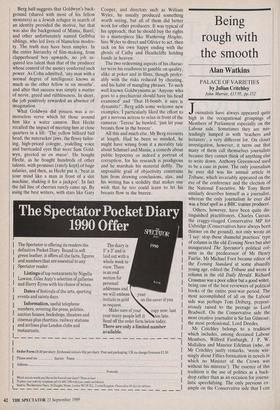Being rough with the smooth
Alan Watkins
PALACE OF VARIETIES by Julian Critchley
John Murray, £13.95, pp.152
Journalists have always appeared quite high in the occupational groupings of Members of Parliament especially on the Labour side. Sometimes they are mis- leadingly lumped in with 'teachers and lecturers', a very different lot. On closer investigation, however, it turns out that many of them call themselves journalists because they cannot think of anything else to write down. Anthony Greenwood used to be a case in point. The only journalism he ever did was his annual article in Tribune, which invariably appeared on the eve of the conference and the election of the National Executive. Mr Tony Henn similarly describes himself as a journalist, whereas the only journalism he ever did was a brief spell as a BBC trainee producer.
Others, however, have been quite dis- tinguished practitioners. Charles Curran, the craggy-visaged Conservative MP for Uxbridge (Conservatives have always been thinner on the ground), not only wrote an 'I say: stop these shameful practices' type of column in the old Evening News but also inaugurated The Spectator's political col- umn as the predecessor of Mr Henry Fairlie. Mr Michael Foot became editor of the Evening Standard at some absurdly young age, edited the Tribune and wrote a column in the old Daily Herald. Richard Crossman was a poor editor but a good writer, being one of the best reviewers of political books of the entire post-war period. The most accomplished of all on the Labour side was perhaps Tom Driberg, prepost- erously raised to the peerage as Lord Bradwell. On the Conservative side the most creative journalist is Sir Ian Gilmour; the most professional, Lord Deedes.
Mr Critchley belongs to a tradition which includes, among deceased Labour Members, Wilfred Fienburgh, J. P. W. Mallalieu and Maurice Edelman (who, as Mr Critchley justly remarks, 'wrote win- ningly about Fifties fornication in novels in which no Minister of the Crown was without his mistress'). The essence of this tradition is the use of politics as a back- drop rather than as an occasion for journa- listic speechifying. The only previous ex- ample on the Conservative side that I can
think of is Christopher Hollis. Mr Critch- ley's sole rival in the present House is Mr Roy Hattersley.
Both Mr Hattersley and he go in for descriptions of the missed-train, lost trous- ers aspects of the legislator's life. No Journalist can be any good unless he is prepared to make a bit of a fool of himself occasionally — or (what is not quite the same thing) to relate how he made a fool of himself. But Mr Critchley is much ruder about his party, its supporters, its func- tionaries and, above all, its leader than any other member of what might be called the Charm School of Political Journalism is, or to the best of my knowledge, ever has been.
He is also wittier. 'The only safe plea- sure for a politician is a bag of boiled sweets' is worthy of Lady Bracknell. 'A bevy of cheerful girls, black and Irish, dispense pots of tea, toast and, at lunch and supper time, plates of undistinguished pork pie of the sort that has an egg in the middle': now that tells you something of what it is like to eat, day after day, in the Members' or, for that matter, the Stran- gers' cafeteria. Mr Critchley is, indeed, particularly strong on eating and politics. 'The food, dear boy, is better, and the ora- tory largely incomprehensible,' the leader of the British delegation, Sir John Rodgers, remarked on welcoming him abroad the good ship Europe.
Not that Mr Critchley was there for the Riesling alone, you understand. On the contrary: in those days young Julian was un homme serieux in matters of Europe and defence, contributing learned articles both to this paper and to the leader page of the Daily Telegraph, those rugby goalposts through which no try was ever converted. His view of himself is, oddly, that it was these earlier, more serious pieces which caused him to be regarded as a lightweight and consequently to be denied preferment. My own opinion is that losing Rochester and Chatham in 1964 had more to do with it. He had to start his parliamentary career all over again later on.
In any case, there have been umpteen more-or-less competent Conservative Ministers of Defence, which is the most he could reasonably have expected. At doing what he does, he is unique. Who else would describe Mr Eric Forth as 'an unattractively dogmatic right-wing Scots- man who sits for a Worcestershire seat' or Mr David Lightbown as someone 'whom many Tories have in the past mistaken for an off-duty policeman'. Long may Mr Critchley be spared by the good Lord to tell and — yes — re-tell us his tales. For, as the music-hall comics of old realised, the old tunes are the best tunes. There used to be people called publishers' readers. They no longer, I believe, exist. It certainly appears that a business with the former reputation of John Murray believes that it can conduct its affairs without making use of their services.



























































 Previous page
Previous page